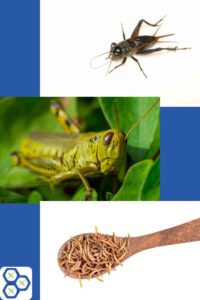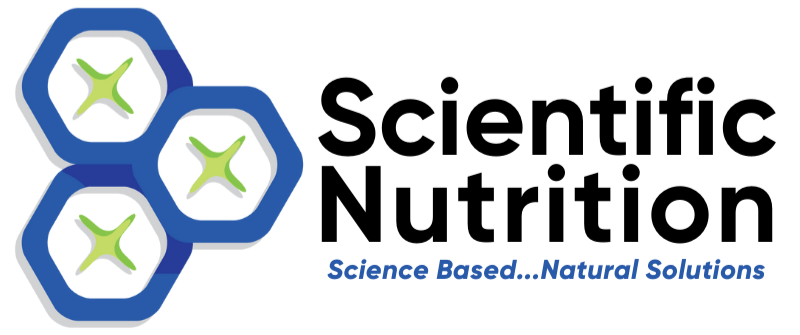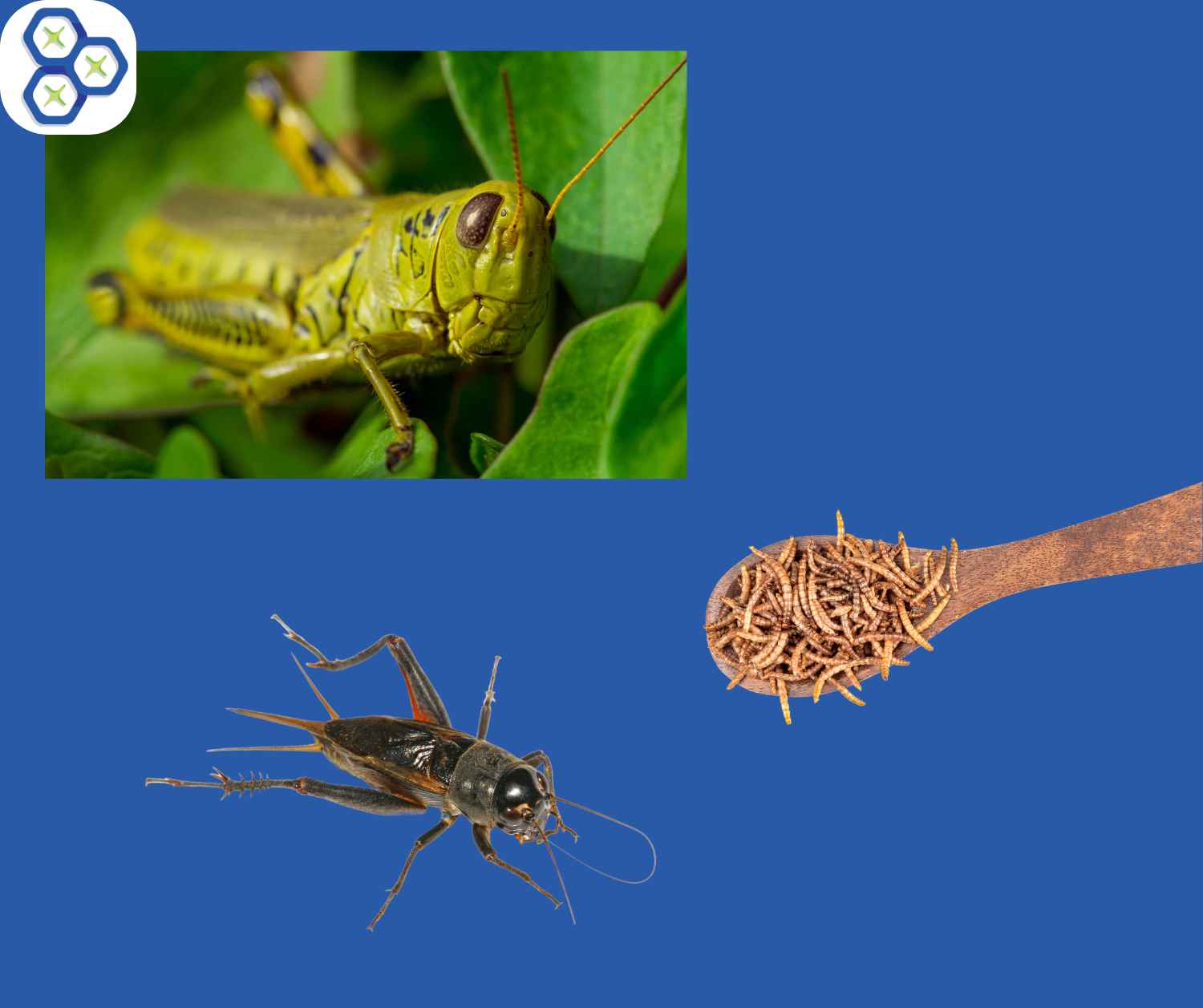The Hidden Risks of Eating Insect Proteins
Insect proteins are gaining traction as the next big thing in sustainable eating.
Why?
They seem like the perfect alternative to traditional meats because they have high protein content and low environmental impact. Regardless of whether you like those ugly, crawly insects or not, 80% of the population in Asia, Africa, and even South and Central America is already consuming this food source as a staple of their diet.
Insects are considered a natural and rich source of proteins…and that’s why there’s hype around them in the food industry.
But is consuming insect protein healthy and safe? Not entirely! There are some downsides.
Some severe concerns include digestive issues, parasite contamination, and nutrient deficiencies. I will discuss those concerns in this blog post, so before you jump on the insect protein bandwagon, read until the end.
Sources of insect proteins
According to the NIH, there are many kinds of edible insects. Edible insects are classified as belonging to the 8 main orders:
- Blattodea (cockroaches and termites)
- Coleoptera (beetles)
- Diptera (flies) including black soldier fly (Hermetia illucens)
- Hemiptera (cicadas, stink bugs)
- Hymenoptera (bees, wasps, ants)
- Lepidoptera (butterflies, moths)
- Odonata (dragonflies)
- Orthoptera (crickets, grasshoppers, locusts)
Does that really sound appetizing??
Foods containing insect protein
Many foods are quietly integrating this powdered bug protein in the form of “flour”. Many foods containing this are bakery goods, as well as cereal-based products such as cookies, bread, tortillas, and pasta.
The NIH mentions roasted speckled cockroach (Nauphoeta cinerea) powder being used as protein enrichment of wheat flour to formulate bread! Bugs like dried yellow mealworm made into a powder and crickets are ground to be added to wheat flour also.
The NIH also found reports that companies are currently working on the extraction and restructuration of insect proteins into versatile food ingredients, like soluble protein powders for beverages and textured insect proteins for meat analogs, and egg or dairy replacements in baking such as cookies and food processing applications (Shockley, Lesnik, Allen, & Muñoz, 2018). This may include energy bars, pasta, and soluble protein powder.
Minced cooked insects are used to formulate meat analog foods like hamburgers, meatballs, and sausages (Elhassan, Wendin, Olsson, & Langton, 2019; Fraqueza & Patarata, 2017).
Clearly choosing clean products from local farmers and cutting out all processed “foods” is in order.
Hidden names for insect proteins
- Acheta Powder
- Exoprotein
- E120
- E904
- Cochineal extract (as coloring)
- Chitin/Chitosan
- MagMeal
- PRO72
- H-Meal
- Beta Hatch mealworm meal (includes CRISPR & RNAi vaccines)
- Okuilli (ground mealworm)
- Hermet Protein for Aqua & Ultra’in – Black Soldier Fly larvae fed to your shrimp
- EnterraProtein
- Liboost fatty acid from larvae
Digestive challenges with insect proteins
Insect proteins come with several digestive challenges that are often overlooked. Four major issues are as follows;
1. Chitin and the human digestive system
Chitin is a tough fiber found in insect exoskeletons. Humans do not easily digest it. Unlike plant-based fibers, chitin resists breaking down in the digestive tract. Various studies (like the one published in NIH) reveal that chitin can cause gastrointestinal discomfort and may lead to bloating or indigestion. Your body lacks the necessary enzymes to break down this rigid substance efficiently.
2. Insect proteins have allergenic reactions 
Insect proteins share structural similarities with shellfish, a common allergen.
If you have a shellfish allergy, consuming insect proteins could trigger similar allergic reactions. Symptoms might include itching, swelling, or even anaphylaxis. The potential for these reactions makes insect proteins risky for many people.
3. Gut microbiome disruption
Your gut microbiome plays a vital role in digestion and overall health. Insect proteins disrupt this balance. Research published in PMC suggests that insect proteins could alter the composition of gut bacteria, leading to digestive issues or reduced nutrient absorption. Maintaining a healthy gut becomes challenging with this unusual dietary shift.
4. Digestive enzymes and insect proteins
Insect proteins are complex and require specific enzymes for proper digestion. Your body may struggle to produce enough enzymes, leading to digestive strain. This difficulty in breaking down insect proteins can result in incomplete digestion, which causes discomfort and reduces the availability of essential nutrients.
Parasite contamination in insect proteins
Insect proteins can carry several parasites. Some of them are mentioned below;
Cryptosporidium
Cryptosporidium is a protozoan parasite often found in insects. It causes cryptosporidiosis, leading to severe diarrhea, dehydration, and abdominal cramps. This parasite is particularly dangerous for individuals with weakened immune systems.
Sarcocystis
Sarcocystis is another protozoan parasite that can be transmitted through insect consumption. It causes sarcocystosis, which leads to muscle pain, swelling, and fever. Though rare, severe cases may require medical intervention.
Toxoplasma
Toxoplasma is a well-known parasite that is often found in insects and causes toxoplasmosis. This condition can result in flu-like symptoms, and in severe cases, it poses significant risks to pregnant women and immunocompromised individuals.
Health risks associated with parasites in insect proteins
Gastrointestinal infections
Parasites like the previously mentioned Cryptosporidium can lead to severe gastrointestinal infections. Symptoms include persistent diarrhea, vomiting, and abdominal pain, which can be particularly harmful to vulnerable populations.
Muscular complications
Parasites such as Sarcocystis can cause painful muscle inflammation and swelling. These symptoms may lead to long-term discomfort and require medical treatment to alleviate.
Systemic health risks
Toxoplasma poses systemic health risks, especially to pregnant women. The parasite can cause congenital toxoplasmosis, leading to miscarriage, stillbirth, or severe neurological damage in newborns. Immunocompromised individuals are also at risk of life-threatening complications.
The presence of these parasites in insect proteins raises serious concerns about their safety. That’s why you need to be careful when considering them as a dietary option.
Nutrient deficiency in insect proteins compared to traditional protein sources
Natural protein sources like beef, chicken, and fish are nutrient-rich and time-tested. These traditional proteins offer complete nutrition and support overall health.
Comparison of nutritional profiles
Insect proteins often fall short when compared to traditional sources. While they contain protein, they lack the essential amino acids your body needs. Beef, chicken, and fish proteins provide a full range of amino acids vital for muscle repair and immune function.
These traditional proteins are also rich in vitamins like B12 and minerals like iron and zinc. In contrast, insect proteins are deficient in these vital nutrients. It makes them a less balanced diet option.
Impact on long-term health
Relying on insect proteins as a primary source could have long-term health consequences. Deficiencies in essential amino acids may lead to muscle loss and weakened immunity over time. A lack of important vitamins and minerals could also result in anemia, fatigue, and impaired cognitive function to name a few.
Some studies suggest that a diet heavy in insect proteins might not support optimal health, especially in the long run. Traditional protein sources, on the other hand, continue to offer comprehensive nutrition that sustains your body’s needs.
The presence of protein allergens, on the other hand, remains a major safety concern surrounding edible insects. Ongoing studies have identified antigens and IgE-binding proteins from several insect species that are correlated to an allergic reaction upon exposure or consumption (Feng et al., 2018; Pali-Schöll et al., 2019; Ribeiro, Cunha, Sousa-Pinto, & Fonseca, 2018).
Healthier and nutrient-rich alternatives to insect proteins
Here are five healthy alternatives to insect proteins that offer complete nutrition and are widely available:
- Quinoa: A complete plant-based protein, quinoa contains all nine essential amino acids. It’s also high in fiber, iron, and magnesium, making it a nutritious alternative to eating bugs.
. - Lentils: Rich in protein, fiber, and essential minerals, lentils are an excellent plant-based option. They support heart health and help maintain stable blood sugar levels.
. - Eggs: Eggs are a high-quality protein source with all of the essential amino acids. They also contain vitamins and minerals like B12, choline, and selenium promoting overall health.
. - Greek Yogurt: This dairy product is high in protein and probiotics, supporting muscle growth and gut health. It’s also a good source of calcium and vitamin D.
. - Lean Poultry (Chicken/Turkey): Lean poultry offers complete protein, low fat, as well as essential nutrients like B vitamins and selenium. It’s a versatile option that supports muscle repair and immune function.
Interestingly, these sources and foods are widely available.
Think twice before you eat/consume insect protein
Insects may be a natural source of protein, and their promotion as a sustainable option has merit. However, the same nutritional benefits can be obtained from other natural sources—without the risks and challenges linked to insect proteins.
So… Why turn to insects when you can access healthier, more reliable protein sources? You can nourish your body effectively without the potential hazards associated with insect consumption.
Animal proteins contain no carbohydrates and less fat than insects without the risks. If you are looking for fiber, eat more steamed or cooked vegetables.
Hair Analysis and Insect Protein
If you’re concerned about your diet or seeking scientific, natural health solutions, I’m here to help. We can see if you are protein deficient on your Hair Mineral Analysis. It will help to point to the foods you need to incorporate to rebuild without the risks that insect protein carries.
Let’s Chat about how you can achieve optimal health without compromising your health or safety!
References and further studies
https://www.ncbi.nlm.nih.gov/pmc/articles/PMC5680136/
https://www.ncbi.nlm.nih.gov/pmc/articles/PMC5680136/
https://food.r-biopharm.com/news/edible-insects-delicacy-or-allergy-risk/
https://www.ncbi.nlm.nih.gov/pmc/articles/PMC9107018/
Copyright Scientific Nutrition, LLC 2024




